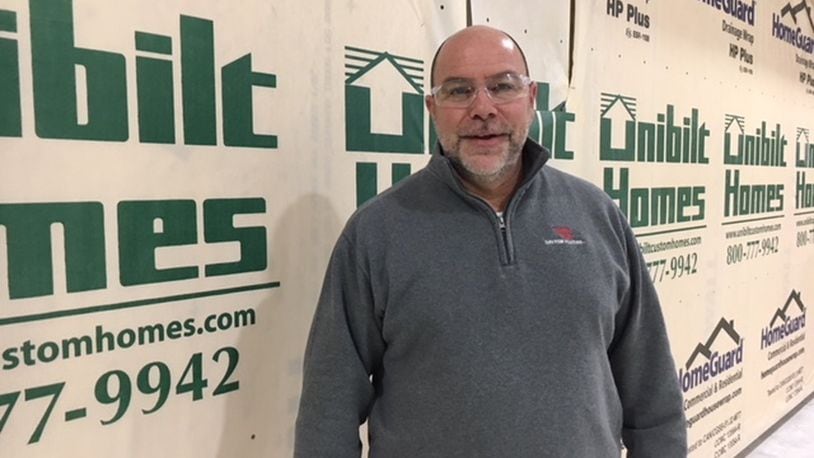Barney bought the company from Sharon and Doug Scholz, who decided to retire.
Scholz’ father Carl started Unibilt in 1969. Barney’s father, Jack, worked with Carl Scholz in the 1950s at Vandalia Sales; the elder Barney started Vandalia Rental in 1961, and that company is now a busy equipment rental business run by Barney’s nephew, Kurt Barney.
3 QUICK READS YOU MAY HAVE MISSED
• Brown pushes union pension recovery plan in Dayton
• Attorneys for DP&L: Utility needs $55M for ‘reasonable rate of return’
• St. Mary’s trailer dealer opens Harrison Twp. site
Unibilt builds modular homes inside an manufacturing complex on Johnson Station Road in Vandalia where weather doesn’t affect storage or construction.
By the time modular homes are placed on their foundations, the structures are 85 percent complete.
“These are built exactly like you build a home out on the job site,” Barney said. “They’re just built in pieces and (shipped) right out to the job site.”
The University of Dayton graduate worked for accounting firm Ernst and Young for eight years before getting into developing and residential “stick-framing.” (“Stick-framing” or “stick-building” are terms Barney uses for building a home on site once lumber and parts have been delivered. The entire house is raised on site.)
Then the Great Recession turned his head around.
“I got through the downturn and kind of re-evaluated everything,” Barney said. “The downturn kind of decimated the industry. A lot of people retired and moved on.”
Finding help
Young people were avoiding construction trades. Demand for new homes didn’t appear to be there. Even today, in a period of renewed demand, it’s difficult to find qualified trades people, Barney said.
Still, the pull of home-building — modular home-building — was there for Barney.
“I view this as something that will become a little more prominent in the industry,” he said. “Right now, you see a lot of people looking at different ways, better ways, to build houses.”
Home-building really hasn’t changed in decades, he said. The lack of qualified trades people — carpenters, framers, plumbers, electricians and many others — are forcing a new look at how homes are built.
“It’s become extremely expensive and really only an affordable product (for the builders) for the higher-end homes,” he said.
Modular homes
Modular building is faster and efficient, Barney believes. All materials are nearby and weather delays aren’t a factor. Framers, plumbers, electricians, drywall finishers and others work at the same station of the build process where perform the same job every day.
TOP BUSINESS STORIES OF WEEK
• Kroger sells off convenience store business for $2.15B
• Toys ‘R’ Us going-out-of-business sales start this week
• Move over, bitcoin. GE researching blockchain technology
Unibilt has 86 employees and is hiring. Barney sees a need for a dozen more employees before 2019.
Materials enter into one end of Unibilt’s 120,000-square-foot production site and at the other end are largely finished homes.
He doesn’t expect modular construction to overtake stick-framing. But he does believe growth is likely.
“I think the thing we fight is a stigma,” Barney said. “Everyone looks at us as a manufacturer of double-wides. And it’s just not like that.”
Unibilt offers a range of custom options, he said.
He declined to discuss the terms of his purchase or to offer revenue or sales numbers. But he said the company is experiencing growth in volume of homes sold and associated revenue.
About the Author
